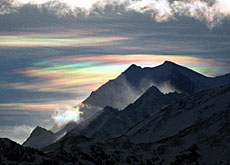
Saving the Alps

Environmental experts from 25 countries have gathered in the Swiss town of Brig to discuss ways of curbing the effects of climate change on the Alps.
Delegates are aiming to draft measures to protect the Alps – which stretch from France to Austria – from natural disasters such as flooding and mudslides.
The Swiss meteorological service, MeteoSwiss, and the Institute for Atmospheric and Climate Science in Zurich have organised two parallel conferences on Alpine weather patterns.
The International Conference on Alpine Meteorology (ICAM) is focusing on the “challenges of mountain meteorology”, while the Mesoscale Alpine Programme (MAP) meeting brings together scientists who recently took part in the largest meteorological research programme ever conducted in the European Alps.
Environmental specialists from Alpine countries including France, Germany, Austria, Switzerland, Italy, Croatia and Slovenia have been meeting every second year since 1950 for the ICAM session.
The MAP conference is a relative newcomer and has only been running since 1999.
“The [Brig] conference facilitates discussion and dialogue between scientists which could result in finding ways to better protect the Alps from meteorological and climate-related catastrophes,” said Peter Binder, head of research and development at MeteoSwiss.
Global warming
Organisers will highlight the continued trend of global warming which is having a noticeable effect on the Alps.
Switzerland’s glaciers, for example, are continuing to shrink – in some cases at an alarming rate, according to the Glacier Monitoring Service.
The Surettagletscher in canton Graubünden is the worst-affected, retreating by 94 metres between 2001 and 2002.
In the Alpine town of Sion, which neighbours Brig, average autumn temperatures have risen 1.7 degrees Celsius since 1864, noted Christoph Schär, president of the Scientific Committee of the ICAM/MAP conference.
He also reported that winter temperatures had risen 2.3 degrees Celsius.
Besides retreating glaciers and rising temperatures, specialists forecast climate change will lead to a growing number of floods.
Disasters
Extreme weather resulting in natural catastrophes such as flooding has been a major topic of discussion at environment conferences.
Storms and flooding which swept the world during 2000 caused damage estimated at SFr7.52 billion ($5.8 billion), according to Swiss reinsurer, Swiss Re.
In October 2000, floods in canton Valais, Ticino and northern Italy resulted in 37 deaths and damage to the tune of SFr700 million.
“These figures show the significance of extreme weather in the Alps,” Schär said in his presentation.
“If changes in the nature and frequency of extreme weather are the result of climate change, there could be significant consequences,” he added.
swissinfo with agencies
The effects of climate change on the Alps form the central issue at a meteorological conference in Brig.
Around 200 experts and researchers from some 25 countries have gathered for the four-day conference.
Organisers are concerned about the trend in global warming that looks set to worsen.

In compliance with the JTI standards
More: SWI swissinfo.ch certified by the Journalism Trust Initiative




























You can find an overview of ongoing debates with our journalists here . Please join us!
If you want to start a conversation about a topic raised in this article or want to report factual errors, email us at english@swissinfo.ch.